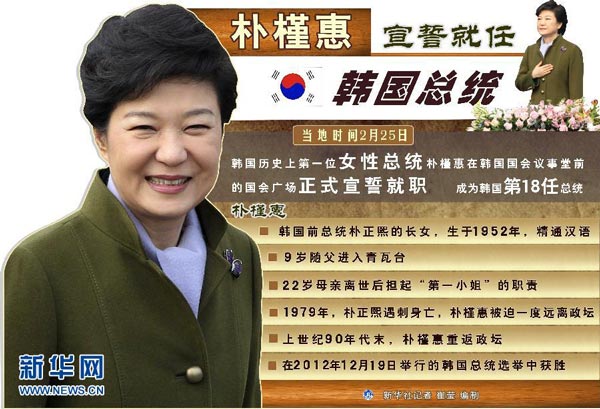

 |
| South Korean President Park Geun-hye (File Photo) |
SEOUL, April 13 -- Close aides to South Korean President Park Geun-hye and heavyweight politicians are being embroiled in a corruption scandal as their names are listed on a brief memo left behind by Sung Wan-jong, the former ruling party lawmaker and businessman who committed suicide last week.
The presidential office Cheong Wa Dae said Monday that close aides or anyone who is convicted of taking bribes after the prosecution's investigation will not be an exception (to punishments).
The comments came a day after President Park urged prosecutors to strictly deal with the case in accordance with law and principles without sanctuary, indicating her willingness to punish whoever is convicted of bribery.
The prosecutors' office formed a special team Sunday to probe the scandal, which became a bombshell dropped in the political arena.
The memo, which was found from a trouser pocket of Sung who killed himself on April 9, involved names and the currency figures next to the names, which strongly indicated bribes delivered to them.
The names included eight powerful politicians, including former presidential chiefs of staff Kim Ki-choon and Huh Tae-yeol, who said to local media that they will cooperate with prosecutors' probe in good faith.
Handwritten next to Huh's name was 700 million won (about 640, 000 U.S. dollars), and next to Kim was 100,000 U.S. dollars along with the date of Sept. 26 2006, around when he accompanied Park on her visit to Belgium and Germany.
Among others were Lee Byung-kee, incumbent presidential chief of staff, and Prime Minister Lee Wan-koo. There were no currency figures next to their names.
Sung, the former ruling Saenuri Party lawmaker and businessman running a mid-sized construction company, was charged with embezzlement and engaging in corruption of the so-called energy diplomacy, advocated under the former President Lee Myung-bak.
He committed suicide on the day when he was presumed to appear in a court to determine the validity of arrest warrants for him.
 J-11 fighters in air exercise
J-11 fighters in air exercise Beauties dancing on the rings
Beauties dancing on the rings Attendants-to-be join Mr. & Miss Campus Contest
Attendants-to-be join Mr. & Miss Campus Contest Beijing's toughest anti-smoking law takes effect
Beijing's toughest anti-smoking law takes effect Family lives in cave for about 50 years in SW China
Family lives in cave for about 50 years in SW China PLA soldiers operating vehicle-mounted guns in drill
PLA soldiers operating vehicle-mounted guns in drill Blind carpenter in E China's Jiangxi
Blind carpenter in E China's Jiangxi China hosts overseas disaster relief exercise for the first time
China hosts overseas disaster relief exercise for the first time 20 pairs of twins who will become flight attendants in Sichuan
20 pairs of twins who will become flight attendants in Sichuan Obama is sowing discontent in S.China Sea
Obama is sowing discontent in S.China Sea Rescuers work through night to reach cruise ship survivors
Rescuers work through night to reach cruise ship survivors Driving through limbo
Driving through limbo Facing down MERS
Facing down MERSDay|Week